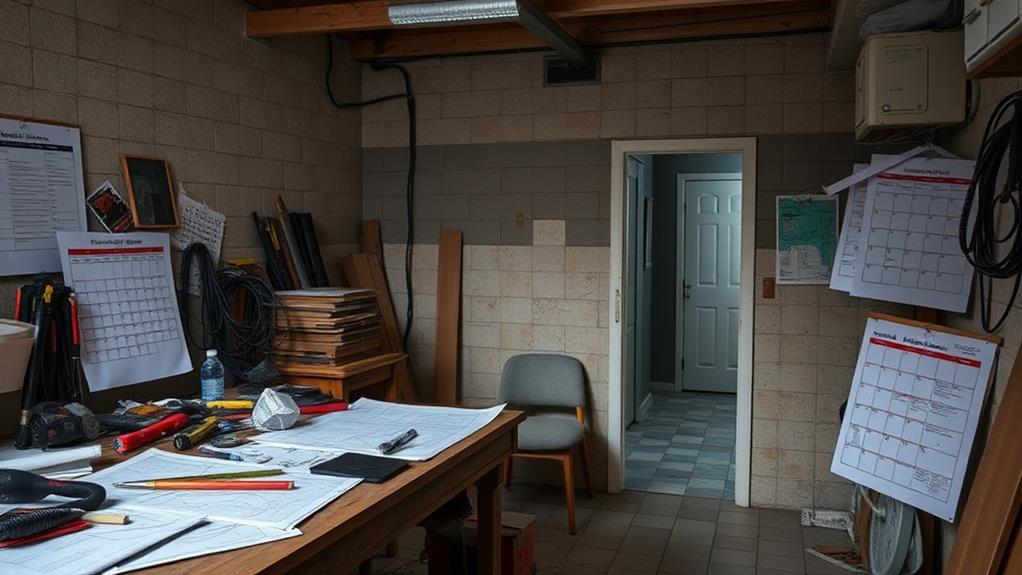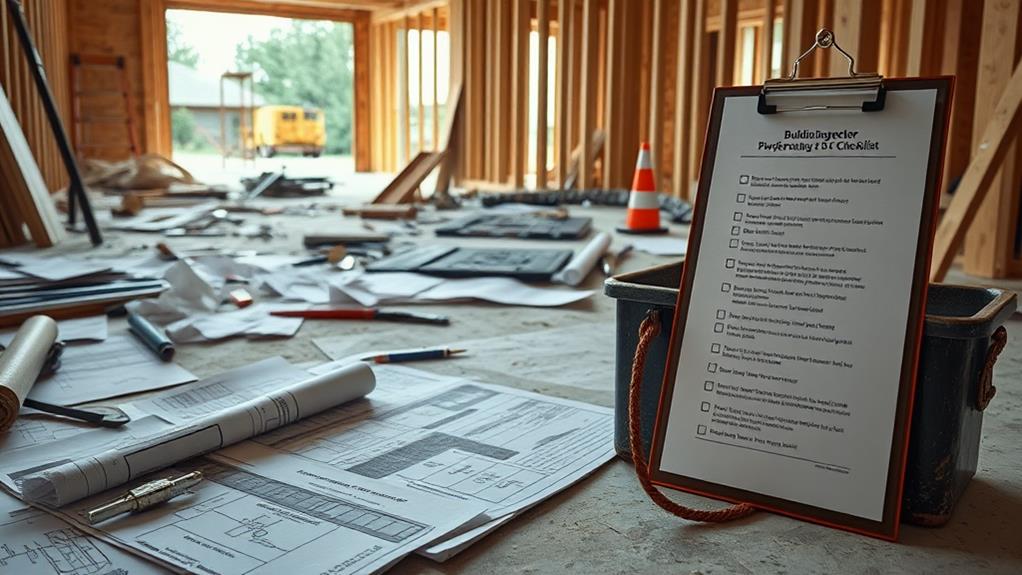Contractors often make mistakes that can affect a renovation project's success. Common errors include inadequate project planning, which leads to unexpected costs and delays. They might overlook budget constraints, resulting in overspending. Poor communication with clients can cause misunderstandings about preferences and expectations. Ignoring structural issues, like foundation or roof problems, is another big mistake. Additionally, neglecting permits and codes can create legal headaches. Many contractors also underestimate timelines or prioritize low costs over quality. Finally, unclear contracts can lead to disputes and financial surprises. If you want to understand these issues in depth, keep exploring.
Inadequate Project Planning

Inadequate project planning can sabotage even the best renovation intentions. When you don't establish a clear project scope, misunderstandings can arise. In fact, 70% of contractors say that scope creep—when a project's requirements expand beyond the original plan—poses a significant challenge. This often leads to delays and can inflate costs.
To avoid these pitfalls, it's crucial to seek referrals and verify a contractor's credentials, ensuring they've the necessary experience and reliable local contractors to manage your project effectively.
Insufficient communication during the planning phase can also create confusion, resulting in costly change orders that might increase project costs by 10-20%.
Furthermore, if you skip thorough site assessments, you risk discovering hidden issues later on. About 40% of contractors report that these unexpected problems can lead to major delays and budget overruns.
Overlooking Budget Constraints
Budgeting is the backbone of any successful renovation project, yet many contractors overlook essential financial constraints. When contractors underestimate project costs, they often fail to account for hidden expenses, which can lead to budget overruns that exceed initial estimates by 10-20%. This oversight can create significant financial strain.
Here are three common pitfalls related to overlooking budget constraints:
- Vague Project Scopes: Without detailed planning, contractors may miss important materials or labor costs, resulting in unexpected expenses.
- Lack of Contingency Funds: Failing to include contingency funds can leave contractors unprepared for unforeseen issues, increasing the risk of going over budget.
- Neglecting to Track Spending: Regularly updating and monitoring expenses against the budget is essential. If contractors don't do this, they might miss warning signs of financial strain, jeopardizing project completion.
Poor Communication With Clients

Miscommunication can derail even the most well-planned renovation projects. When there's poor communication between you and your contractor, misunderstandings about the project scope often arise. This confusion can lead to costly change orders and frustrating delays. Studies show that 70% of renovation projects deal with scope creep, mainly due to unclear communication.
Regular updates are vital. If your contractor isn't providing these, you might feel uninformed and frustrated. In fact, 80% of homeowners prefer weekly check-ins to discuss progress and address concerns.
Misalignment on design expectations can also stem from inadequate discussions. Nearly 60% of clients report dissatisfaction with the final results because of a lack of clarity during planning.
It's important to document changes and agreements in writing. Statistics reveal that 65% of renovation conflicts come from verbal agreements that weren't properly recorded.
Additionally, contractors who don't actively seek client feedback risk alienating you. Research shows that 75% of homeowners would feel more satisfied if their opinions were consistently valued throughout the renovation process.
Clear communication helps guarantee a smoother, more enjoyable renovation experience.
Ignoring Structural Issues
When renovating, it's easy to overlook critical structural issues like foundation problems and load-bearing walls.
Ignoring these elements can lead to serious safety hazards and costly repairs later on.
To keep your project on track and guarantee a safe living environment, it's vital to address these concerns from the start.
Overlooking Foundation Problems
Foundation problems can easily slip through the cracks during a renovation, especially if contractors don't conduct thorough initial assessments. Ignoring these structural issues can lead to costly repairs and significant damage.
It's vital to address potential foundation problems early on to avoid complications later. Here's what you should keep an eye out for:
- Cracks in walls or floors: These can indicate underlying issues. If left unchecked, they may worsen over time.
- Uneven floors or misaligned door frames: Such signs often point to settling or shifting foundations, which can escalate into serious concerns.
- Water infiltration: Failing to manage water can lead to mold growth and damage to building materials, creating an unhealthy environment.
Thorough inspections are essential for proactive identification of these problems.
Ignoring Load-Bearing Walls
Ignoring load-bearing walls during renovations can lead to serious structural issues that jeopardize a building's integrity. Load-bearing walls are important because they support the weight of the structure above. If contractors misidentify these walls, it could result in catastrophic collapses, making safety a significant concern.
To avoid this, it's imperative to conduct a thorough assessment of your home's framework before starting any renovation work.
When you make alterations, failing to support load-bearing walls properly can cause sagging floors, cracked ceilings, and costly damage throughout the building. It's crucial to consult with structural engineers who can help you identify these critical components.
Additionally, obtaining the necessary building permits and adhering to local building codes guarantees compliance with safety regulations.
Neglecting Roof Integrity
Many contractors underestimate the vital importance of roof integrity during renovations, which can lead to severe structural problems down the line.
When you neglect roof integrity, you're inviting a host of issues that could jeopardize the entire project. Here are three important points to take into account:
- Water Damage: Ignoring signs like stains or leaks can result in costly repairs later, as these often indicate underlying roof deterioration.
- Roofing Materials: Failing to inspect roofing materials and their installation increases vulnerability to weather damage and can reduce energy efficiency.
- Ventilation and Insulation: Neglecting these aspects can cause moisture buildup, leading to mold growth and further structural damage.
If you don't prioritize roof integrity, you may face liability issues, as compromised roofs can create safety hazards for occupants.
In the long run, addressing these concerns not only protects the building but also safeguards your reputation as a contractor.
Neglecting Permits and Codes

When you're renovating, it's essential to get the right permits and follow local building codes.
If contractors skip these steps, you could face fines, safety issues, and even trouble selling your home later.
Understanding the importance of this oversight can save you from unnecessary legal headaches and guarantee your project goes smoothly.
Permit Process Oversight
Though it might seem like a minor detail, neglecting the permit process can lead to major headaches during renovations. When contractors skip obtaining necessary building permits, they risk facing fines and may have to redo work that doesn't meet local building codes. This can create unsafe structures and costly modifications down the line.
To avoid these pitfalls, keep these key points in mind:
- Understand the Permit Process: Make sure you know what permits you need before starting any work. Different types of renovations may require various permits, especially specialized work like electrical or plumbing changes.
- Communicate Clearly: Maintain open lines of communication with your contractor about the permit process. This helps clarify responsibilities and project timelines, preventing misunderstandings that can delay completion.
- Plan for Time: Don't underestimate the time it takes to secure building permits. Delays in the permit process can stall project progress and affect your overall renovation schedule.
Code Compliance Failures
Neglecting code compliance can lead to significant setbacks in your renovation project, as contractors often overlook essential regulations that guarantee safety and legality. Failing to obtain the necessary building permits can result in costly fines, legal issues, and even the requirement to undo completed work.
It's imperative to adhere to local building codes; ignoring these can create unsafe structures that put occupants at risk and expose contractors to liability.
Additionally, some contractors forget the importance of inspections during various stages of construction. These inspections are essential for ensuring code compliance, and skipping them can lead to expensive and time-consuming violations that need to be corrected later.
Many renovation projects face delays due to issues with code compliance, as unpermitted work may need to be redone to meet regulatory standards.
Inadequate documentation and communication about code requirements can also create misunderstandings between you and the contractor. This can compromise the integrity of your renovation project.
To avoid these pitfalls, make sure your contractor prioritizes code compliance and is diligent about obtaining building permits, scheduling inspections, and following local building codes throughout the renovation process.
Underestimating Timeline Requirements
Underestimating timeline requirements is a common pitfall for contractors that can lead to frustrating delays and unhappy homeowners.
When you rush to set project timelines without a detailed plan, it's easy to overlook unforeseen obstacles that might arise, especially in older homes.
Studies show that renovations often take 20-30% longer than initially projected, which can be a shock to homeowners.
Here are three critical factors that can exacerbate timeline issues:
- Permit Approval Times: Some jurisdictions take weeks to process permits. Failure to account for this can lead to unexpected holdups.
- Material Procurement: If there are supply chain disruptions, contractors may not accurately assess the time required to obtain necessary materials.
- Communication: Inadequate communication between contractors and subcontractors can lead to scheduling conflicts, causing further delays.
Focusing on Cost Over Quality

Quality should always be a priority in renovation projects, yet many contractors fall into the trap of focusing solely on cost. When contractors prioritize low cost, they often choose cheaper materials that may save money upfront but lead to higher long-term maintenance and replacement costs. This choice can diminish the overall value of your renovation.
In fact, studies show that investing in quality materials can boost property value by 10-15%.
Additionally, cost-cutting can result in subpar workmanship. Poor craftsmanship not only affects the look of your space but can also create structural issues that require expensive repairs. When contractors compromise on quality, customer dissatisfaction often follows; about 70% of homeowners wouldn't recommend a contractor who used low-quality materials.
Moreover, neglecting quality can lead to project delays. Ongoing repairs and replacements of inferior materials disrupt timelines and increase labor expenses, causing frustration.
Lack of Clear Contracts
When contractors focus on cost-cutting, they often overlook the importance of having clear contracts in place. A lack of clear contracts can lead to misunderstandings about the project scope, which can create disputes over expectations and deliverables.
Here are three key issues that can arise from poorly defined contracts:
- Unexpected Costs: Without detailed line items for products, materials, and labor, you may face surprise expenses that strain your budget.
- Timelines: Contracts that don't specify timelines or completion dates can lead to ambiguity, resulting in prolonged projects and dissatisfaction.
- Change Orders: If your contract lacks clauses about change orders, it can result in miscommunication when adjustments are necessary, leading to financial strain.
Additionally, contracts that haven't been legally reviewed can expose you to risks and liabilities. This can lead to costly repercussions if disputes arise due to unclear terms.
To avoid these pitfalls, guarantee your contractor provides a clear, detailed contract that outlines project scope, timelines, and costs, including how change orders will be handled.
Clear contracts not only protect you but also help create a smoother renovation process.
Conclusion
To sum up, avoiding common renovation mistakes can save you time, money, and stress. Did you know that nearly 60% of homeowners experience issues during renovations due to poor planning? By focusing on clear communication, sticking to your budget, and ensuring all permits are in place, you can tackle your project successfully. Remember, a little preparation goes a long way in making your renovation dreams a reality. So, stay informed and be proactive to achieve the best results!


Leave a Reply